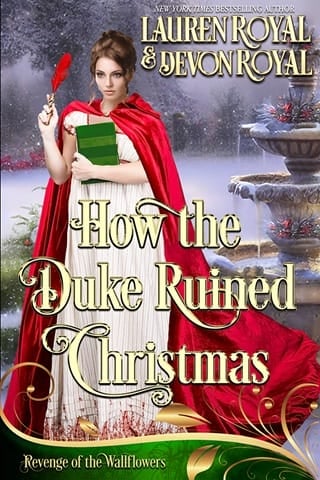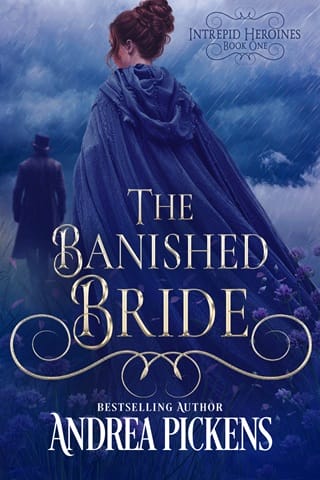Eleven
“ W ait—” Claire began.
“Just over here,” Jonathan said firmly, propelling her onward.
He didn’t let up until they’d got far enough from the tent to avoid prying ears. Then he relinquished her shoulder and, bracing for her reaction, blurted out, “There was no footman.”
“I worked that out for myself,” she said dryly.
And to his amazement, with perfect equanimity, continued their walk.
He kept pace beside her, wondering what she could be thinking. “I’m sorry for the trick,” he ventured. “But I thought you might need a respite from the party, presumptuous though that may be. I wanted to make certain you were all right.”
“You mean: You wanted to make certain I didn’t lose my temper.”
Sheepishly he raised his eyes—and, to his great surprise, found hers twinkling. “You’re taking this extraordinarily well.”
“You’re right; I ought to be scolding you. But as I did need a respite and I was losing my temper, I cannot conceive how.”
“You could scold me for tricking you,” he suggested.
“You really think I have any right to reproach you on that score?”
He grinned. “Fair point.”
The matter settled, they strolled along companionably till Claire asked, “Where are we going?”
A moment’s reflection taught him where his feet were headed. “The Venus Room. Unless you’d rather rejoin the others?”
“Goodness, no!”
Her vehemence once again raised Jonathan’s curiosity. But he kept to himself as they ambled among the hovels—thatched structures purpose-built to protect the site’s most significant archeological findings.
The hovel they ducked into had been built upon the Roman foundation walls of a large, airy room that jutted out from the rest of the complex. Lysons had concluded it was an audience chamber, where the villa’s owner would have conducted public business, received supplicants, and dispensed local justice.
“Ah, I remember this room,” Claire said, blinking round the dim interior. “Mr. Lysons said it was your favorite.”
Jonathan nodded. The chamber’s expansive floor was almost entirely filled by a masterpiece of ancient tile-work, much finer and more detailed than the Medusa. At its apex was the head of Venus, goddess of love and fertility, flanked by her customary peacocks and lotus flowers.
“These little cupids are darling.” Claire crouched to admire an ancillary segment of the mosaic. “What are they doing?”
Though he knew the cupids by heart, Jonathan moved to regard them over her shoulder.
The winged figures occupied a strip of vignettes which, taken together, told a story. “Those two are dressed as gladiators of differing classes: a secutor and a retiarius . Here, you see them in combat. Here, the secutor is kept from killing the retiarius . Next, before the fight resumes, the retiarius shows generosity by offering a fallen helmet to his opponent, who spurns it. Lastly, we see the secutor strike his death blow.”
“Hmph. Seems rather a callous allegory. What does it mean?”
“Who can say? Roman ethics bore little resemblance to our own.” He couldn’t resist adding (with feigned innocence): “Perhaps the retiarius is a traitor and his generosity a mere ploy. I’d argue such men deserve callousness.”
Her sharp look told him she’d caught his meaning—in this instance, the retiarius was Milstead. Straightening up, she began a ponderous turn about the room.
He suspected she was deciding how much to disclose.
“That is one possible interpretation,” she said at last, clasping her hands behind her as she walked. “Shall I tell you another?”
“Please do.”
“Let us suppose the two gladiators are of disparate origins.”
“Quite plausible, since they were often drawn from the far reaches of the empire.”
“Indeed. And due to their mismatched views, though the reta—roti ? —”
“Retiarius.”
“Yes, though the retiarius’s gesture is sincere, the secutor takes it amiss.”
“Ah, a clash of customs.”
Claire nodded. “You agree, then, that in such cases neither party can be blamed? Not the retiarius for offering the helmet, nor the secutor for spurning it?”
“Well now, let me see…” Jonathan was still working out the parallels between fiction and reality. If he inferred the secutor to be Claire… “By chance, after the helmet is spurned, does the retiarius bestow it on another?”
She made a wry face. “Perhaps, in a moment of ill humor.”
That confirmed his inference. But what hand, if any, had this third party in causing the breach? “Has the other been receiving helmets all along, behind the secutor’s back?”
Claire coughed to cover a laugh. “I’m sure I’ve no reason to think so. But,” she added with a pert toss of her head, “who can say?”
Then Miss Harris had not been the cause. What had? And how serious were its effects?
Were Claire and Milstead finished, or merely at odds?
Jonathan shook his head. “I’m afraid I cannot answer your question without knowing what, precisely, was the original offense.”
She came instantly to a standstill. “I cannot tell you that.”
“Oh?” Though Jonathan remained outwardly calm, anger simmered inside him. Just what had the blackguard done, that she could not bear to speak of it? “Claire, whatever happened, upon my honor—and your brother’s, too—we shall set things aright. If you’ve been compromised, or threatened in any way?—”
“Horsefeathers, no!” She slapped a hand to her forehead. “Nothing like that! You read too many novels. The truth isn’t a bit sinister. It’s just…” Cringing, she kept her eyes hidden behind her hand. “It’s silly. You would laugh at me.”
“I would not.”
“Yes, you would.”
“No, I wouldn’t, and I refuse to squabble in this adolescent manner. I’ve no desire to force you to tell me.” Indeed, now reassured of her safety, he was pleased enough by his rival’s misstep, never mind the explanations. “But should you wish to tell me—as your friend—I promise I won’t laugh. I won’t even respond, unless you ask it of me.”
At length she lowered her hand, though without raising her eyes. She seemed about to speak when the silence was broken by the sound of approaching chatter.
“That’s Mr. Hawkins’s voice,” Jonathan whispered. “We can slip away if we hurry!”
Seizing her hand, he drew her outside and to the door of the next hovel, which stood ajar. But after peeping in, he shook his head and pulled back.
“Your sister and Talbot,” he relayed in another whisper, hastening her along to the next door. Pushing it open, he yanked her inside.
This hovel was mercifully empty. He left the door open for a modicum of light and unquestionable respectability.
Blinking as his eyes readjusted to the dim, he recognized the Summer Dining Room. Here was to be found a magnificent mosaic of Jupiter and Ganymede, prince of Troy. But Jonathan didn’t even glance at it, as his gaze was fixed on Claire.
She had made straight for the piscina —a low, hexagonal stone basin in the center of the wide chamber, now empty though it would have once held an ornamental fountain. He watched as she sank abruptly onto its lip and hugged her knees to her chest.
Jonathan was alarmed, for he’d not ever seen her in such a state. He’d never beheld her divested of her ladylike graces, not even during the ordeal of last Christmas. He felt it must indicate extreme distress or her increasing comfort in his presence—or both—and could only hope it was just the latter.
Fearing to startle her, he moved slowly and silently to a corner of the room. There he settled down to wait, leaning against the wall until she was ready to talk.
He watched and waited.
She stared at the mosaic floor.
At last he heard a heavy sigh.
“He put a blanket over us both,” she said all in a rush, immediately checking herself with a weak laugh. “I know, I know, it’s hardly a great liberty. Nothing to set the scandal sheets aflame. ‘Unmarried couple share blanket on innocent sleigh ride’—the horror!” Her troubled expression belied her playful tone. “In truth, I’ve no idea whether I had any right to feel bothered. We were courting, after all. I told myself to stop being silly and just ignore it.”
Had Jonathan felt it were wise to interject, he might have countered that it was a great liberty and she had every right to feel bothered by such indecorum. In concert with his own judgment, the fact that Miss Harris, of all people, had found it noteworthy proved the point.
But he thought it better to remain silent. He’d promised not to respond unless asked, after all.
“As it turned out, though, I couldn’t ignore it,” she continued quietly. “So I thought to just nudge the blanket aside inch by inch, very discreetly, and free myself without drawing notice.”
She shook her head in apparent disbelief—though whether at herself or that bounder Milstead, he didn’t know.
“Even so,” she went on, “he noticed. He asked me what I was doing and why, and when I explained, at first he seemed to take it well. He said he set great store by my distress—and was mortified to have given offense, and made reference to profuse apologies, unendurable shame, and the like…but the longer he rattled on, the more he seemed to be speaking of offenses received rather than bestowed.”
Once more Jonathan wanted to interject, but he held himself back.
She blew out a breath, still staring at the floor. “By way of a small excuse for his mistake, he said he’d had no idea that I was so very proper, for I’d shown no indication I was that sort of lady. Of course, now armed with the knowledge, he would happily make allowances…”
Jonathan folded his arms.
“…although he had to say, purely for the sake of candor, that my pretense of virtue had left him feeling slightly ill-used. For being no stranger to women’s tricks, and having long prided himself on resisting all our little stratagems, was he now to turn round and cast himself into my trap? In fact, given this new window into my character, he felt it might be prudent to reassess our suitability for one another…”
Jonathan ground his teeth.
“…yet after a little reflection, he believed he knew his own mind, and despite his very natural reservations—and in view of my compelling attractions—in short, I’d left him no choice but to circumvent my modesty by proposing on the spot.”
She paused, probably to catch her breath.
What was your answer? Jonathan yelled in his head.
It took everything he had to clench his jaw shut till she went on.
She cleared her throat. “Forgive me, in reciting these words I’ve realized the man who uttered them is a pompous worm. I must have noticed it when he said them—indeed, thinking back now, I remember feeling nettled—but I suppose I was only half-listening to his speech, since during the whole of it he was…”
She trailed off, rubbing her furrowed brow.
He was… what? On the sharpest of tenterhooks, his mouth dry and his jaw aching, Jonathan wondered what could possibly be coming next.
Having already rattled her with his forward behavior, disparaged her character with insinuations, and solicited her hand in perhaps the most insulting terms imaginable, to what further heights of boorishness could Milstead have aspired?
“Forgive me,” she repeated haltingly, “I’m finding this difficult to explain. For I was about to relate my outrage that during the whole of Lord Milstead’s speech, in defiance of his supposed apologies, he still had me trapped under the blanket. But as it happens…that is false. For in fact he never touched me, excepting the briefest of contact to stay my hand when he first realized I was shifting it. After that, I could have removed it at any time.”
At last she looked up. And over at him.
His breath caught.
Determined to be supportive—as a friend —he somehow managed to lock his gaze on hers with a steadiness he didn’t feel.
“But I left the blanket there,” she mused, looking up to the thatched ceiling. Her tone had turned speculative, as though she might be talking to herself. “Though I itched to have the dratted thing off me, though I felt excruciatingly aware of and all but tortured by it, I let it be. Why did I do that? And why did I let him rattle on and on, instead of interrupting? And why didn’t I refuse his offer?”
This was too much for even Jonathan’s self-command, and a breathless query forced its way out. “You are engaged?”
“No.” She looked back to him. “I begged time to consider my answer.”
He breathed a secret sigh of relief.
“But I ought to have dismissed him outright, for in truth there’s nothing to consider. If I cannot bring myself to share a blanket with the man, how could I share my life with him?” A slightly hysterical laugh bubbled out of her. “And I don’t know why I lied. I’ve never been one to hold my tongue. Even with how I’ve changed since last Christmas”—a flicker in her gaze told Jonathan she meant since you left —“still, I don’t know why I shrank from him. I cannot understand myself.”
Jonathan could understand her; at least, he thought he might . For she had indeed changed. Noah had written of these changes, and Jonathan had noticed nearly as soon as he’d stepped foot in the castle.
Dampened spirits, a new restraint. A sparkle missing from her eyes.
And for those changes he blamed himself. If he’d wondered whether his actions had crushed her, now he had his answer.
And the confirmation crushed him .
The full knowledge of what he’d wrought—the damage to her tender and beautiful soul—was a heavy weight upon his own.
But worse yet, he could see how he’d paved the way for men like Milstead to inflict further damage. For Jonathan suspected the old Claire of being far too robust to interest such men: too lively for entertaining their tedious advances, too self-assured for their perseverance to whittle away her defenses. She would have tired of the pompous worm long before he got her in that sleigh. And he’d have never got the chance to trample her down with his insidious tactics and diminishing words.
Jonathan had given him that chance. With his pigheaded mistakes, he had trampled her first.
And for that he would never forgive himself.
The sight of Claire—magnificent, formidable Claire—now huddled on the edge of the low stone basin, questioning her own reason, could not but trigger an avalanche of self-reproach. He had done this to her. And he must fix it.
But how?
What could he do or say to make her whole again?
Almost as soon as he’d asked the question, his efforts to answer it were thwarted—by the sudden appearance of the pompous worm himself.
 Fullepub
Fullepub 



